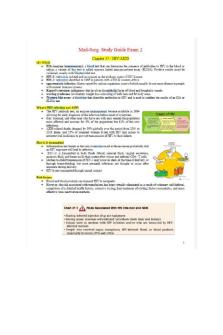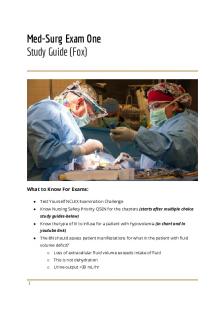Med surg hesi study guide help, good for you PDF

| Title | Med surg hesi study guide help, good for you |
|---|---|
| Author | Kelley Griffin |
| Course | NURS |
| Institution | South Georgia State College |
| Pages | 13 |
| File Size | 685.7 KB |
| File Type | |
| Total Downloads | 55 |
| Total Views | 143 |
Summary
Med surg hesi study guide help, good for you, read this, it will help with the class...
Description
NRSG1650 - Adult Health Nursing II Semester Credit Hours
6.0
Clock hours
180 Total
45 Lecture
0 Lab
135 Clinical
Course Description This course focuses on analyzing the nursing process in order to provide client-centered care for adult clients with one or more chronic health alterations while reducing risk potential. Emphasis is placed on the care of clients with chronic alterations of selected body functions. Students apply the concepts of management, organization systems, health promotion, health education, evidence-based practice, therapeutic communication, and interprofessional collaboration. Clinical learning experiences provide students opportunities to apply theoretical nursing concepts, promote healthy behaviors, and implement safe, quality care to clients and selected groups in a variety of settings across the lifespan.
Prerequisites MATH1320, ENGL1310, BIOL1310, BIOL1111, BIOL1330, BIOL1320, BIOL1121, PSYC1320, NRSG1730, NRSG1210, NRSG1640, PSYC1310.
Textbooks and Supporting Material • • • • • • • •
Ackley, B. J. & Ladwig, G. B., & Flynn Makic, M.B. (2019). Nursing diagnosis handbook: An evidencebased guide to planning care (12th ed.). Elsevier. HESI. (2017). HESI comprehensive review for the NCLEX-RN examination (5th ed.). Elsevier. Ignatavicius, D., & Workman, L., (2018). Medical-surgical nursing: Patient centered collaborative care (9th ed.). Elsevier. Ignatavicius, D., Workman, M.L., LaCharity, L.A., & Kumagai, C.K. (2018). Clinical nursing judgment study guide for medical-surgical nursing: Patient centered collaborative care (9th ed.). Elsevier. Myers, E. (2014). RNotes: Nurse's clinical pocket guide (4th ed.). F. A. Davis. Nix, S. (2017). Williams’ basic nutrition & diet therapy (15th ed.). Elsevier. Silvestri, L.A. (2017). Saunders comprehensive review for the NCLEX-RN examination (7th ed.). Elsevier. Skidmore-Roth, L. (2020). Mosby's drug guide for nursing students (14th ed.). Elsevier.
Online Applications • •
HESI. (2015). HESI Patient Reviews with RN Case Studies and Practice Test [Software]. Elsevier. Ignatavicius, D., & Workman, L., (2018). Elsevier Adaptive Quizzing for Medical-Surgical Nursing: Patient Centered Collaborative Care (9th ed.) [Software]. Elsevier.
Course Structure The course faculty will employ multiple methods for content delivery that are appropriate to the type of material presented. Instructional methods include, but are not limited to, didactic, demonstration, facilitation, practice, game theory, discussion, case studies, simulation, role-playing, and projects.
Course Outcomes Upon successful completion of this course the student will be able to: 1. Analyze the use of the nursing process and knowledge of nutrition, pharmacology, psychosocial and physiological integrity while providing client centered care for clients experiencing chronic health alterations.
PROPERTY OF CONCORDE CAREER COLLEGES, INC. FOR TERMS STARTING ON OR AFTER 08/23/2021
PAGE 1 OF 13
2. Integrate principles of teamwork and collaboration as a participant of the interprofessional healthcare team in providing safe, quality care for adult clients experiencing chronic alterations in health status while reducing risk potential. 3. Provide health and safety education to adult clients experiencing chronic alterations in health status to promote healthy behaviors. 4. Apply organizational, management and priority-setting skills used in the provision of safe, quality clientcentered care to adults with chronic alterations in health status. 5. Evaluate strategies to reduce risk of harm that will increase the effectiveness of quality improvement strategies. 6. Adhere to behaviors that prevent errors. 7. Differentiate communication practices that minimize risks associated with documentation among providers during transitions in care.
End of Program Student Learning Outcomes 1. Provide safe, compassionate, and competent nursing care to patients and families from diverse backgrounds across the lifespan in a variety of healthcare settings. 2. Collaborate with members of the inter-professional health care team to manage and coordinate the provision of safe, quality care for patients and families. 3. Utilize the nursing process, best current evidence, critical thinking, and patient/family input to promote health and achieve optimal patient outcomes. 4. Communicate effectively through verbal, nonverbal, and technological methods with patients, families, and members of the inter-professional healthcare team.
Methods of Evaluation Items of Measurement Exams Quizzes Assignments Proctored Practice Exam Remediation Clinical Assessment Total
Value 78% 8% 7% 3% 4% Pass/Fail 100%
Exams: Exams will cover the weekly content as listed in the course schedule and any remediation content as developed by the course faculty. Students MUST achieve an exam average of 78% or higher to pass the course. Quizzes: Includes assessments during class and/or lab meetings. Assignments: Includes all adaptive quizzing, patient reviews, case studies and additional assignments. Proctored Practice Exam: This exam is a comprehensive review of course content and is delivered in a proctored format to prepare students for licensure testing success as well as practice in answering application and analysis style questions. Students should refer to course schedule for topical outline of potential subjects. Students will be required to complete an advisory session with the course faculty/director to determine areas of strength and weakness and a remediation packet will be created and should be completed prior to the Proctored Final Exam.
PROPERTY OF CONCORDE CAREER COLLEGES, INC. FOR TERMS STARTING ON OR AFTER 08/23/2021
PAGE 2 OF 13
Proctored Final Exam: This exam is a comprehensive review of course content and is delivered in a proctored format to prepare students for licensure testing success as well as practice in answering application and analysis style questions. Students should refer to course schedule for topical outline of potential subjects. To be admitted to the Proctored Final Exam, students should have completed and remediated a Proctored Practice Exam conducted earlier in the course. Students MUST achieve a minimum conversion score of 70 on the Proctored Final Exam to pass the course. Remediation: Remediation and review are a vital part of the student learning experience. Students will be required to complete an advisory session with their assigned Advisor to determine areas of strength and weakness. All exams will require remediation. Faculty will remediate missed exam concepts. For HESI® exams, remediation packets will be created by HESI® for each student. Remediation packets will be divided into two tiers, 'Essential' and 'Recommended'. Students will automatically receive recommended packets for each concept where the HESI® score is less than 850. Essential packets will be prioritized to help students focus on their weakest concepts. In order to receive a satisfactory grade in remediation, all essential packets and course faculty assigned recommended packets should be completed in their entirety with a minimum average post assessment score of 78% or higher prior to the administration of the next scheduled HESI® exam. Failure to complete remediation by the due date will result in a zero (0) for the remediation score in the gradebook. Clinical Assessment: For all courses with a clinical component, nursing students are required to satisfactorily meet the clinical objectives to pass the course. Failure to meet the clinical objectives will result in a grade of “F” for the course. A student that fails a course due to clinical performance, will be deemed to have failed the classroom component of the course and will be required to repeat both the clinical and classroom components of the course.
Viewing Grades Students receive points for graded activities. Those points will be posted to the Gradebook in Canvas. Faculty will update grades in Canvas each time a grading session has been completed.
Grading Calculation Final grades assigned for this course will be based on the percentage of total points earned and are assigned as follows. Grades do not round.
Letter Grade
Percentage
Description
93-100% Exceptionally Competent 85-92% Highly Competent 78-84% Fully Competent 77% or less Not Competent *Must be repeated for credit.
A B C F*
In addition to achieving an overall course grade of 78%, students must also achieve a 78% exam average AND achieve a specific conversion score based on the table below to pass the course. Term
Minimum HESI® Final Conversion Score
3
60
PROPERTY OF CONCORDE CAREER COLLEGES, INC. FOR TERMS STARTING ON OR AFTER 08/23/2021
HESI® Exam Conversion Score 0-59.99 60-77.99
Grade Entered in Canvas Gradebook Conversion Score Earned 78 PAGE 3 OF 13
Term
Minimum HESI® Final Conversion Score
4
64
5
70
6
72
7
76
8
78
HESI® Exam Conversion Score 78 and above 0-63.99 64-77.99 78 and above 0-69.99 70-77.99 78 and above 0-71.99 72-77.99 78 and above 0-75.99 76-77.99 78 and above 0-77.99 78 and above
Grade Entered in Canvas Gradebook Conversion Score Earned Conversion Score Earned 78 Conversion Score Earned Conversion Score Earned 78 Conversion Score Earned Conversion Score Earned 78 Conversion Score Earned Conversion Score Earned 78 Conversion Score Earned Conversion Score Earned Conversion Score Earned
Failure to meet both a 78% or higher exam average AND the appropriate conversion score may result in a repeat and/or failure of the course. If a student’s final overall numerical grade is 78% or higher but they did not meet either the 78% exam average and/or the required conversion score the student’s letter grade will be lowered according to the following table: Final Numerical Grade
Updated Final Grade
77% or lower
F
Proctored Testing Grading Scale: The nursing program utilizes the Health Education Systems Incorporated (HESI®) exams to assess student knowledge throughout the program. These exams provide two scores based on the student’s performance. The conversion score provides a weighted grading score based on difficulty of the exam content (each question is graded according to difficulty). The HESI® score provides a score based on NCLEX® (licensure testing) probabilities and content application capabilities. The conversion score will be used to grade both the practice and final versions of the HESI® exam. Students are required to achieve a minimum conversion score, based on the table above to pass the course.
Module Assignment Grading Scale The module assignments as listed on the course schedule reflect the use of Adaptive Quizzing resources as provided by faculty. These products are designed to build and assess a student’s knowledge of course content in a progressive fashion. As students gain understanding of the course content students will note a progression in results from Novice/level 1 (knowledge & comprehension), through Intermediate/Level 2 to Proficient/level 3 (application, evaluation, analysis). The grading scale for these assignments is as follows:
PROPERTY OF CONCORDE CAREER COLLEGES, INC. FOR TERMS STARTING ON OR AFTER 08/23/2021
PAGE 4 OF 13
Level
Completion SettingProficient / Level 3
Completion SettingIntermediate / Level 2
Proficient / Level 3
100%
100%
Intermediate / Level 2
80%
100%
Novice / Level 1
70%
80%
Below Novice / level 1
0%
0%
Outline of Main Topics: Concepts/Content
Cardiac
Cellular Regulation
Topics • • • • •
Aneurysms Cardiomyopathy Basic Electrocardiogram (EKG) Dysrhythmias Heart Failure
• • • •
Anemias Leukemias Coagulation Disorders Cancer Development & Management: Skin
•
•
Raynaud Phenomenon Transfusion Therapy
Communication
•
Interdisciplinary Reporting
Endocrine System
• • • • • •
Hyper/Hypothyroidism Hyper/Hypoparathyroidism Hyper/Hypopituitarism Adrenal Gland Hypo/Hyperfunction Diabetes Insipidus Syndrome of Inappropriate Antidiuretic Hormone Secretion (SIADH)
•
•
End of Life Treatments Patient Bill of Rights
• • • •
Peptic Ulcer Disease Irritable Bowel Disease Ulcerative Colitis Crohn’s Disease
Circulation
Ethics & Legal
Gastrointestinal System
PROPERTY OF CONCORDE CAREER COLLEGES, INC. FOR TERMS STARTING ON OR AFTER 08/23/2021
•
PAGE 5 OF 13
Concepts/Content
Topics • •
•
Immune System
• • • •
• Inflammation
•
•
Herniation Hemorrhoids Cholecystitis Sources of Infection HIV/AIDS Multidrug-Resistant MRSA CRE/VRE Endocarditis Pericarditis
•
Irritations & Infections Psoriasis Eczema
Leadership & Management
•
Delegation of Task
Musculoskeletal System
• • • • •
Osteoporosis Osteomalacia Osteomyelitis Muscular Dystrophy Carpal Tunnel Syndrome Paget’s Disease
Integumentary System
• •
•
Neurology
• • •
•
Renal System
• • • • • • • • •
•
PROPERTY OF CONCORDE CAREER COLLEGES, INC. FOR TERMS STARTING ON OR AFTER 08/23/2021
Seizures Meningitis Multiple Sclerosis Amyotrophic Lateral Sclerosis Chronic Kidney Disease Chronic Glomerulonephritis Cystitis Hydronephrosis Urethritis Urethral Strictures Urolithiasis Nephrotic Syndrome Pyelonephritis Renal Calculi
PAGE 6 OF 13
Concepts/Content Reproductive System
Respiratory System
Sensory
Topics • •
Benign Prostate Hyperplasia Transurethral Resection of the prostate (TURP)
• • •
•
Influenza Pneumonia Tuberculosis Lung Abscess
•
Peripheral Neuropathy
Outside Classroom Work Students will find the work in each program to be challenging, requiring them to maximize their time and problem-solving strategies. Students demonstrate their commitment to learning via work and time spent inside and outside the class. In addition to the time spent in class per week, students are required to spend time outside of class on reading assignments, writing assignments, practice and practical applications, and projects or other equivalent learning experiences to help them achieve the course objectives. For every hour spent in lecture or lab it is assumed the student will spend a minimum of two hours in preparation for, completing homework, or reviewing each session.
Conduct Students must adhere to the Code of Conduct, to include conduct that will not interfere with the learning process of any other student, the classroom instruction, or the progress of the class in general. The school administration reserves the right, in the exercise of the outcome, to suspend and/or dismiss a student for any reason as listed in the college catalog. A student dismissed for unsatisfactory conduct is not eligible for readmission.
Scholastic Honesty It is assumed that all students are enrolled in class to learn; therefore, cheating is not an acceptable practice. Dishonesty of any type, including cheating on examinations or plagiarizing materials, can result in a grade of “F” and may be cause for suspension and/or withdrawal from school. Plagiarism includes passing off, or attempting to pass off, the ideas or writing of another person as one’s own.
Clinical/Lab Attendance Requirements Students are required to attend all scheduled clinical and laboratory sessions. Students absences that result in not completing the required clinical hours, lab competencies, or cases required by curriculum, regulatory or accreditor standards, shall fail the course. Clinical or lab make-up sessions may be provided; however, the program’s ability to provide make-up hours is dependent upon scheduling and other factors which may prohibit the availability of clinical make-up hours. If a make-up day is not available, the student will fail the clinical portion of class, which will result in failing the course. Students should refer to the catalog for the complete attendance policy.
PROPERTY OF CONCORDE CAREER COLLEGES, INC. FOR TERMS STARTING ON OR AFTER 08/23/2021
PAGE 7 OF 13
Licensure Readiness Plan Remediation and review are a vital part of the student learning experience. Students will be required to complete an advisory session with their assigned Advisor to determine areas of strength and weakness. The Licensure Readiness Plan is a comprehensive analysis of student performance across multiple standardized exams. Remediation plans submitted throughout the program will be assessed to determine growth and progress in areas critical to the profession of nursing. Students are provided advisement on methods of remediation and review in preparation for their final comprehensive Exit HESI® Exam and licensure exam.
PROPERTY OF CONCORDE CAREER COLLEGES, INC. FOR TERMS STARTING ON OR AFTER 08/23/2021
PAGE 8 OF 13
Week 1
Concepts/Topics Orientation to Resources and Online Applications Cardiac Aneurysms Cardiomyopathy Basic EKG Dysrhythmias Heart Failures
2
3
Readings Ignatavicius • CH 34 pg. 664-690 • CH 35 pg. 691- 719 Silvestri • CH 56
Inflammation Endocarditis Pericarditis
Ignatavicius • CH 35 pg. 691-719 • CH 36 pg. 720-750
Circulation Raynaud Phenomenon Transfusion Therapy
Silvestri • CH 57
Cellular Regulation Anemias Leukemias Coagulation Disorders Renal System Kidney Disease (Acute & Chronic) Hydronephrosis Urethral Strictures Nephrotic Syndrome
Assignments Homework 1: Ignatavicius EAQ • CH 35
Items Due this Week Syllabus Receipt
Proctored T4 Final Exam Remediation
HESI Patient Reviews Case Study: • Heart Failure with Atrial Fibrillation
Homework 2: Ignatavicius EAQ • CH 36
Ignatavicius • CH 39 pg. 795- 807 • CH 40 pg. 808-838 • CH 67 pg. 1372- 1389 • CH 68 pg. 1390-1427
Homework 3: Ignatavicius EAQ • CH 67 • CH 68
Silvestri • CH 48 • CH 49
HESI Patient Reviews Patient Review • Mr. Singh
Exam 1 Homework 1
Quiz 1 Homework 2
HESI Patient Reviews Practice Test • Medical Surgical Practice Quiz PROPERTY OF CONCORDE CAREER COLLEGES, INC. FOR TERMS STARTING ON OR AFTER 06/07/2021
PAGE 9 OF 13
Week 4
Concepts/Topics Renal System Urolithiasis Renal Calculi Inflammation Glomerulonephritis Cystitis Urethritis Pyelonephritis
Readings Ignatavicius • CH 66 pg. 1343 – 1371 • CH 67 pg. 1372- 1389 • CH 72 pg. 1473- 1491
Assignments Homework 4: Ignatavicius EAQ • CH 66
Items Due this Week Exam 2 Homework 3
Silvestri • CH 58 • CH 59
Reproductive System Benign Prostatic Hyperplasia Prostatitis 5
6
Endocrine System Hyper/Hypothyroidism Hyper/Hypoparathyroidism Hyper/Hypopituitarism Adrenal Gland Hypo/Hy...
Similar Free PDFs

Med Surg Study guide Notes
- 66 Pages

Med Surg 2 Final Study Guide
- 25 Pages
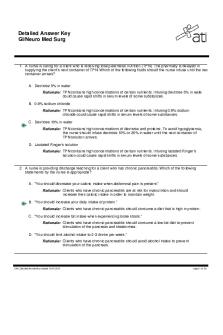
Ati gi med surg - Gi study guide
- 53 Pages
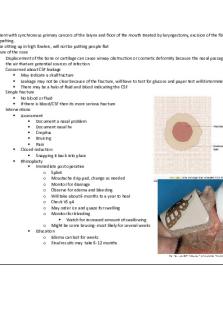
Med Surg II - Exam 2 Study Guide
- 57 Pages

Med surg exam 1 study guide
- 25 Pages
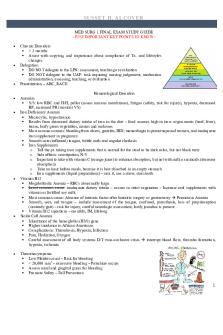
MED SURG 1 Final EXAM Study Guide
- 10 Pages

Med Surg 2 Exam 3 Study Guide
- 22 Pages

Med-Surg Test #2 Study Guide
- 10 Pages

Med surg exam 3 study guide
- 68 Pages
Popular Institutions
- Tinajero National High School - Annex
- Politeknik Caltex Riau
- Yokohama City University
- SGT University
- University of Al-Qadisiyah
- Divine Word College of Vigan
- Techniek College Rotterdam
- Universidade de Santiago
- Universiti Teknologi MARA Cawangan Johor Kampus Pasir Gudang
- Poltekkes Kemenkes Yogyakarta
- Baguio City National High School
- Colegio san marcos
- preparatoria uno
- Centro de Bachillerato Tecnológico Industrial y de Servicios No. 107
- Dalian Maritime University
- Quang Trung Secondary School
- Colegio Tecnológico en Informática
- Corporación Regional de Educación Superior
- Grupo CEDVA
- Dar Al Uloom University
- Centro de Estudios Preuniversitarios de la Universidad Nacional de Ingeniería
- 上智大学
- Aakash International School, Nuna Majara
- San Felipe Neri Catholic School
- Kang Chiao International School - New Taipei City
- Misamis Occidental National High School
- Institución Educativa Escuela Normal Juan Ladrilleros
- Kolehiyo ng Pantukan
- Batanes State College
- Instituto Continental
- Sekolah Menengah Kejuruan Kesehatan Kaltara (Tarakan)
- Colegio de La Inmaculada Concepcion - Cebu





